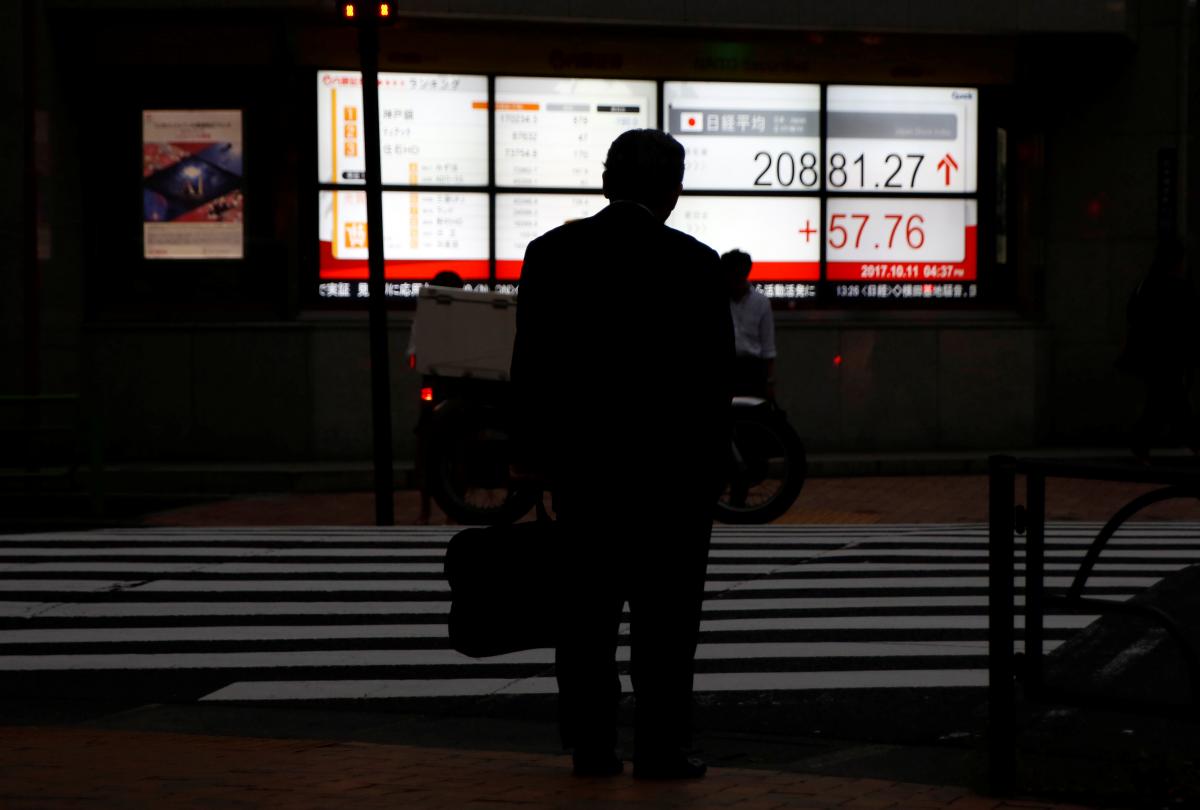
TOKYO (Reuters) – As the developed world’s cheapest equity market and home to a rising breed of more profitable companies, the Japanese market should be a safe investment bet.
Yet fund managers are bypassing it on fears ebbing global growth could knock Japan’s economy, home to multinationals like Toyota Motor Corp (7203.T) and Sony Corp (6758.T), which are closely tapped into world supply chains.
Long dogged by disappointment over the structural reforms Prime Minister Shinzo Abe had promised, it’s not hard to see why funds are lukewarm toward the cheap market- the world’s third-biggest economy barely escaped recession earlier this year, and the yen hasn’t weakened enough to prop up its exports.
In a warning sign of what might be in store, a Wall Street rout this week sent the Tokyo’s Nikkei share average crashing into bear market territory, underscoring how synchronized Japan is to the global economic cycle.
Prospects for global demand are at their most dire in years, hurt mainly by the year-long U.S.-China trade war and the Federal Reserve’s steady monetary tightening.
“Japan is a global cyclical market and it’s the wrong time in the cycle,” said Mark Baribeau, head of global equity at Jennison Associates, one of PGIM’s investment arms in Boston, which manages $181 billion in assets.
“We are very much underweight Japan. At different timing of the cycle, it can be more attractive.”
It is little surprise then that worries about slowing economic growth and the outlook for corporate earnings have sent investors scampering to the exits.
The Nikkei .N225 has fallen rapidly from its 27-year peak in early October and is now down 12.1 percent for the year. The Topix .TOPX has tumbled 21.8 percent from its January high. Exchange data shows foreigners’ net selling of Japanese shares is on track to hit the largest ever this year, with their net selling soaring to 13.1 trillion yen ($120 billion), including in cash equities and in futures, at the end of last week.
(GRAPHIC: Foreign investors in Japan – JPY= and boosted exporters’ profits. The central bank has also supported the market more directly by purchasing hefty amounts of shares every year.
While the BOJ’s stimulus has propped up stocks, it has failed to deliver the primary goal of achieving two percent inflation and to foster sustainable economic growth.
Moreover, critics say the BOJ’s purchases of six trillion yen of exchange-traded funds (ETFs) a year has reduced tradable shares and increased market volatility.
The world’s largest money manager BlackRock (BLK.N), which has $6.44 trillion in assets under management globally, downgraded its stance on Japanese equities in July to neutral from overweight.
Nigel Bolton, London-based chief investment officer (CIO) of international equities at BlackRock, said he sees “no catalysts for change.”
Such views come despite the rise over recent years of Japanese companies’ notoriously low return-on-equity to levels on par with many European peers.
And Japanese corporate profits have outpaced America’s since Prime Minister Abe took office in December, 2012. Shares are cheap, trading well below 12 times earnings, which is the lowest in six years.
(GRAPHIC: ROE comparison – tmsnrt.rs/2Rcp1L2)
“In Japan, you are paying 2008-style discounts and Japanese companies have out-earned both European and U.S. companies. It’s just that no one wants to pay for it,” said Norman Villamin, Zurich-based CIO at Swiss private bank Union Bancaire Privée, with 128 billion Swiss francs ($130 billion) in assets.
Indeed, many investors see these improvements as cyclical, and have doubts about the sustainability of earnings growth.
“You’ve seen Japanese returns on equity rising to about the 10 percent level – it’s very solid by traditional Japanese standards. But the question is if it’s going to go up or down here,” said Ned Gray, global and international value equity CIO at Macquarie Investment Management in Philadelphia.
Mustafa Sagun, equities CIO at Principal Global Investors, with $451 billion in assets, said the Iowa-based asset manager remained modestly underweight Japan over the past couple of months. “After the (post-Fed) selloff, there are great value opportunities in Asia, including Japan. But our stance did not change,” Sagun said, referring to a sharp equities downturn after the latest Fed rate hike this month – the fourth for the year.
“The catalyst needs to be resolution of uncertainty regarding potential trade wars and U.S. interest rates.”
(GRAPHIC: Japanese corporate profits – tmsnrt.rs/2AdDE73)
(GRAPHIC: Japan stock valuations – tmsnrt.rs/2RbEWJA)
(This story corrects name to Baribeau in paragraph six.)
 0 comments
0 comments





